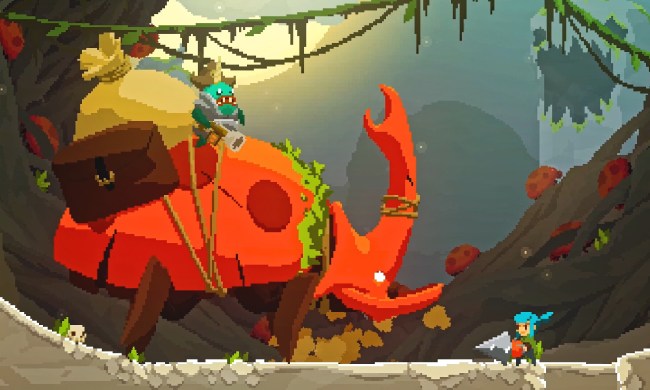It’s already been a surprising year for video game success stories. As gamers wade through a slow year for major game releases, out-of-left-field indies are dominating sales charts. Last month saw the release of Valheim, a survival game that’s been a persistent and mind-boggling success on Steam.
This past weekend brought another big indie hit that had gamers buzzing. Loop Hero, a new game published by Devolver Digital, debuted at number two on the Steam top sellers chart, just behind Valheim. The new game cleverly mashes up several genres to reinvent the wheel, not unlike last year’s Hades. Here’s what to know about the latest indie hit.
A strong gameplay loop
Loop Hero combines so many different genres that it can be a little overwhelming. At its most basic level, it’s a “roguelite” where players walk around a looped path slaying enemies and collecting resources. The goal is to collect gear that can make the main character stronger and resources that can be brought back to camp. Eventually, players come face-to-face with the Lich King, a powerful creature that acts as a sort of final boss of each run. Like any roguelite, players start each new run fresh, with none of the gear collected from their previous run.
That should sound simple enough for anyone who’s familiar with the genre, but there are several twists. Players don’t actually manually move their characters, and they have no control during fights. It’s essentially an idle game that plays itself with the hero always moving forward and attacking on their own.
Instead of controlling the character directly, players can equip different gear obtained through defeating enemies or plundering chests. It’s more about setting the main character up for success by constantly tweaking a build that’s tough enough to beat the final boss. Gear comes with all sorts of perks, from health generation to attack speed boosts, allowing players to really fine-tune their hero.
The main thing that players control is how difficult each loop will be for their hero. There’s a slight deck-building aspect to the game, where players pick a pack of tiles that can be placed on the map throughout a run. Tiles can be anything from rocks that grant materials or vampire houses that spawn more powerful enemies on the loop. The longer a run goes, the more complex and crowded the map becomes with self-imposed challenges.
What’s particularly exciting about the mechanic is that tiles all interact with one another in ways that are never explained to the player. Throw a meadow next to a rock and the grass will bloom, healing players more each time they complete a loop. Create a three-by-three grid of mountains and they form a single peak that spawns a powerful enemy. These combos are constantly surprising, making for some fun experimentation on each run.

Back to camp
As if that wasn’t complex enough, Loop Hero has a base-building component too. After each run, players take any goods they’ve collected back to a camp where they can build new structures. Each one gives the hero new perks, like the power to resurrect one time after a death or extra healing. It’s a smart progression system that makes runs just as much about trying to collect as many resources as possible as they are about trying to beat the final boss.
While the “loop” in Loop Hero refers to the cyclical path players walk around, it’s also a fitting descriptor for the game’s strengths. The hook is the gameplay loop that gets created as players bounce between resource-collecting runs and camp upgrades that continually add more complexity to the game.
Loop Hero’s greatest strength is that it’s surprisingly chill, considering how deep it gets. The idle gameplay makes it a perfect multitasking game — pair it with a podcast for best results. I managed to rack up eight hours in the game over the weekend in the blink of an eye, all while watching sports in the background.
For curious Steam users, Loop Hero is currently on sale until March 11 for $13. It’s already shaping up to be one of the year’s best indies, on par with recent hits like Into the Breach, Darkest Dungeon, and Hades. In a year where AAA games will be in short supply, it’s a great way to kill some time between big games.



